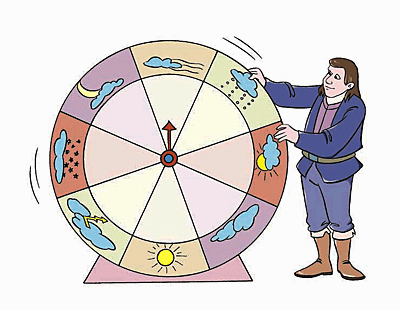chronomancy
(s) (noun) (no pl)
Divination to determine the precise or favorable time for some action:
Chronomancy is also a foretelling or prediction of a lucky or unlucky day!
Chronomancy was formerly practiced especially in China.
chyromancy
(s) (noun), chyromancies
(pl)
Divination with the hands; chiromancy: Since Jenny was interested in chyromancy, she wanted to get a book about it and look at the palms of all of he school mates!
cledonismantia
(s) (noun) (no pl)
An ancient system of fortune-telling based on the good or evil presage of certain words uttered without premeditation when people came together in any way: Cledonismantia also regulated the words to be used on particular occasions or events. Cicero stated that the Pythagoreans were very attentive to these presages, and according to Pausanius, cledonismantia was a favorite method of divination at Smyrna, where the oracles of Apollo were interpreted.
cledonomancy
(s) (noun) (no pl)
Divination by the way of interpreting events or fortuitous comments: Cledonomancy involves omens or lucky charms by listening to utterances of mantic significance, or by interpreting unplanned events, such as to predict remarks of a conversation before it begins.
cleidomancy, clidomancy
(s) (noun) (no pl)
Divination by use of a key or keys: A form of radiesthesia is cleidomancy in which a dangling keys is seen as a pendulum and then interpreted by its swinging motion.
conchomancy
(s) (noun) (no pl)
Fortune telling with sea shells: When the family was at the sea shore, their children loved to play conchomancy by choosing the nicest sea shells and telling each other if they were going to marry and have children in the future.
crithomancy
(s) (noun) (no pl)
Fortune telling by using food, like bread and grain:
Crithomancy is a kind of divination by spreading grain or cake dough over sacrificed victims.
Crithomancy also included personal predications, and observations were made of the unusual behavior of grains, dough, or the cakes themselves.
Sometimes crithomancy is misspelled as "critomancy".
cromniomancy
(s) (noun) (no pl)
A prophecy by using onions or their sprouts:
Cromniomancy is a divination by the way of names, significant happenings, or missing persons written on onions, planted, and observed to see which one would sprout first.
The onion which sprouted most rapidly indicated that the person whose name had been inscribed on it was enjoying vigorous health.
Another application was that wishes would come true if a person burnt onion skins on a fire. Sometimes the onions had to be placed on the altar at Christmas before they had any divine significance.
cromnyomancy
(s) (noun) (no pl)
Divination by using onions: After discovering the term cromnyomancy in her book on prophecies, Jill tried out frying onions to see if she could interpret the forms they made in the frying pan!
cryptomancy
(s) (noun) (no pl)
Divination with secret signs, words, etc.: Cryptomancy can contain hidden messages or some unrevealed method that is used by a soothsayer.. .
crystallomancy, crystal gazing
(s) (noun) (no pl)
Divination by means of a crystal or other transparent body, especially a beryl: Little Sally sat at the table with a glass globe in front of her and tried to induce a psychic condition so that she could do some crystallomancy to impress her friends.
cubomancy
(s) (noun), cubomancies
(pl)
Divination with thrown dice or with cubed bones. The girls sat at the table and decided to play cubomancy by fortunetelling their future husbands by casting small cubes that had 1 to 6 dots on the side surfaces.
cyclomancy
(s) (noun) (no pl)
Divination with some revolving device, such as a wheel or revolving circle: At the fairgrounds, Jack wanted to go to the large rotating circle with messages and signs on it, and by the method of
cyclomancy, see what his future prospects would be.

Sometimes people wonder if this is the same system that is being used by modern weather forecasters to predict current weather conditions.
The “wheel-of-fortune” found at carnivals or on the TV “Wheel of Fortune” are based on this concept. Cyclomancy has survived in various parlor games, such as “spin the bottle”.
cylicomancy
(s) (noun) (no pl)
Perceiving psychic visions on a clear, shiny water surface in a cup instead of a crystal: Mrs. Black wanted to try out cylicomancy by looking at the glistening surface of the tea in her cup and find out if her husband would be returning safely from his trip.
dactyliomancy, dactylomancy, dactyomancy
(s) (noun) (no pl)
Divination with finger rings: Dactyliomancy is said to work “. . . by holding a ring suspended by a fine thread over a round table on the edge of which were a number of marks with the 24 [Greek] letters of the alphabet. The ring was consecrated with a great deal of mystery.”
Cross references of word families that are related directly, or indirectly, to: "divination, diviner; seer, soothsayer, prophecy, prophesy, prophet":
augur-;
auspic-;
fa-, fate;
Fates in action;
futur-;
omen;
-phemia;
sorc-, sorcery;
vati-.
A cross reference of other word family units that are related directly, or indirectly, to: "chance, luck, fate":
aleato-;
auspic-;
cad-;
fortu-;
serendipity;
sorc;
temer-;
tycho-.



